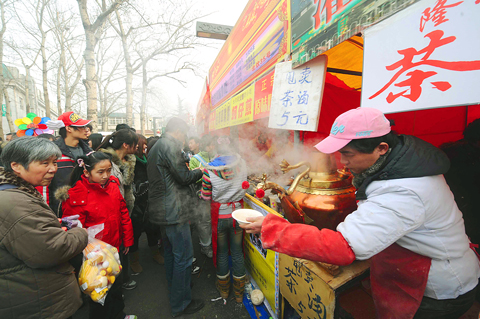China tightened rules on personal and working capital loans to prevent them from being used for speculation after credit growth and asset prices gained.
Lenders should not “over-grant” the loans that companies use to finance goods and services and must reasonably calculate their “real demand,” the China Banking Regulatory Commission said in a statement on Saturday. The rules took effect on Feb. 12.
The tightening reflects concern that funds might have been diverted to stocks and property, raising the risk of asset bubbles and bad loans. Banks extended 19 percent of this year’s 7.5 trillion yuan (US$1.1 trillion) lending target last month and property prices rose the most in 21 months.

PHOTO: AFP
The regulator will punish lenders that freely distribute working capital loans and companies that use such loans for purposes such as capital expenditure, stake investment and some other areas that the government doesn’t allow, the commission said.
China took the second step in a month to restrain inflation and damp asset prices by ordering lenders on the eve of a weeklong holiday to set aside larger reserves. The benchmark Shanghai Composite Index has declined 7.9 percent this year to 3,018.13 on Feb. 12, before the reserve-ratio announcement.
Commission chairman Liu Mingkang (劉明康) said in an opinion piece last month that bank loans had been channeled into stock and property markets and the watchdog “stepped in to stop that.”
China tightened rules on loans for homes, automobiles, fixed-asset investments and working capital to limit speculative flows.
The commission said advances exceeding 300,000 yuan fore personal loans would be given directly to the borrower’s counterparty, rather than the borrower. The rules also took effect on Feb. 12.
Banks will be barred from issuing personal loans without identifying the intended use and they must meet the borrowers in person before granting credit to avoid fraud, the commission said.
Draft rules were announced in July and October.
Separately, foreign direct investment in China climbed for a sixth month as the effects of the financial crisis faded. Investment rose 7.8 percent from a year earlier to US$8.13 billion, the Ministry of Commerce said in a statement on Saturday. The gain compared with a doubling in December.
Foreign direct investment in China started to climb in August last year after falling for 10 straight months because of the global financial crisis.
China’s US$90.03 billion total for last year was 2.6 percent less than in 2008, according to commerce ministry figures released last month.
The country’s outbound non-financial investment was US$2.36 billion, the ministry said, without giving a year ago comparison.

PATENTS: MediaTek Inc said it would not comment on ongoing legal cases, but does not expect the legal action by Huawei to affect its business operations Smartphone integrated chips designer MediaTek Inc (聯發科) on Friday said that a lawsuit filed by Chinese smartphone brand Huawei Technologies Co (華為) over alleged patent infringements would have little impact on its operations. In an announcement posted on the Taiwan Stock Exchange, MediaTek said that it would not comment on an ongoing legal case. However, the company said that Huawei’s legal action would have little impact on its operations. MediaTek’s statement came after China-based PRIP Research said on Thursday that Huawei filed a lawsuit with a Chinese district court claiming that MediaTek infringed on its patents. The infringement mentioned in the lawsuit likely involved

Taipei is today suspending work, classes and its US$2.4 trillion stock market as Typhoon Gaemi approaches Taiwan with strong winds and heavy rain. The nation is not conducting securities, currency or fixed income trading, statements from its stock and currency exchanges said. Authorities had yesterday issued a warning that the storm could affect people on land and canceled some ship crossings and domestic flights. Taiwan Semiconductor Manufacturing Co (TSMC, 台積電) expects its local chipmaking fabs to maintain normal production, the company said in an e-mailed statement. The main chipmaker for Apple Inc and Nvidia Corp said it has activated routine typhoon alert

GROWTH: TSMC increased its projected revenue growth for this year to more than 25 percent, citing stronger-than-expected demand for AI devices and smartphones The Taiwan Institute of Economic Research (TIER, 台灣經濟研究院) yesterday raised its forecast for Taiwan’s GDP growth this year from 3.29 percent to 3.85 percent, as exports and private investment recovered faster than it predicted three months ago. The Taipei-based think tank also expects that Taiwan would see a 8.19 percent increase in exports this year, better than the 7.55 percent it projected in April, as US technology giants spent more money on artificial intelligence (AI) infrastructure and development. “There will be more AI servers going forward, but it remains to be seen if the momentum would extend to personal computers, smartphones and

Catastrophic computer outages caused by a software update from one company have once again exposed the dangers of global technological dependence on a handful of players, experts said on Friday. A flawed update sent out by the little-known security firm CrowdStrike Holdings Inc brought airlines, TV stations and myriad other aspects of daily life to a standstill. The outages affected companies or individuals that use CrowdStrike on the Microsoft Inc’s Windows platform. When they applied the update, the incompatible software crashed computers into a frozen state known as the “blue screen of death.” “Today CrowdStrike has become a household name, but not in